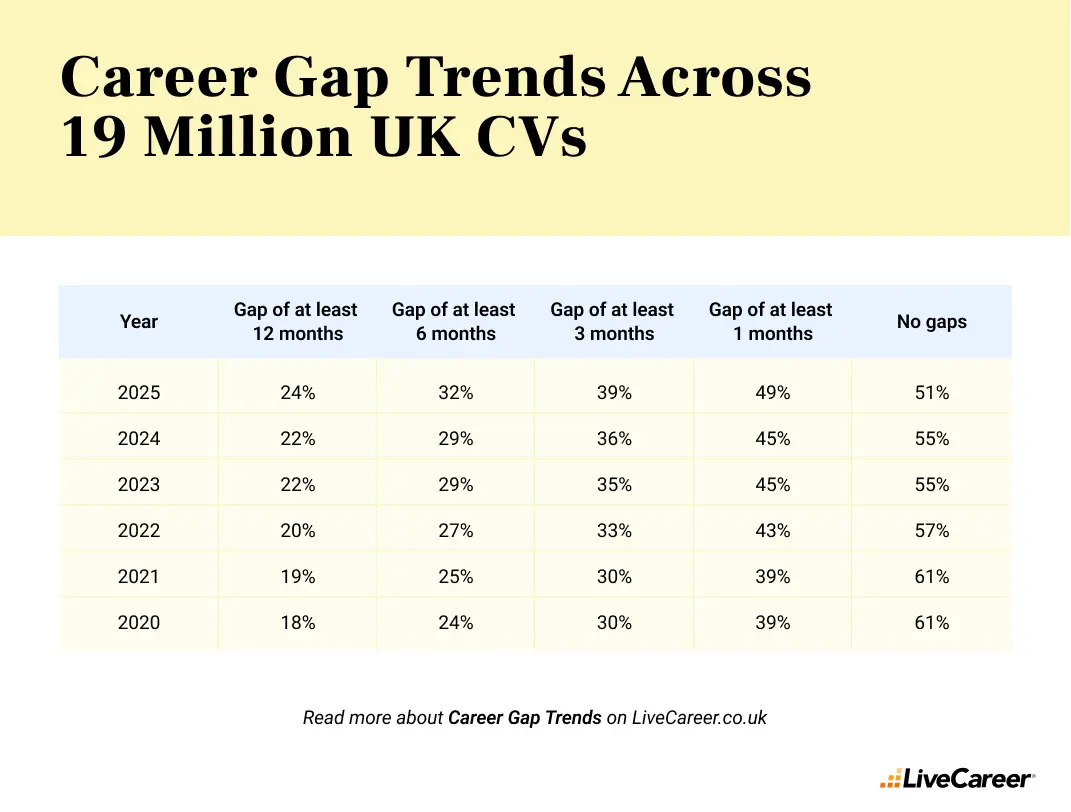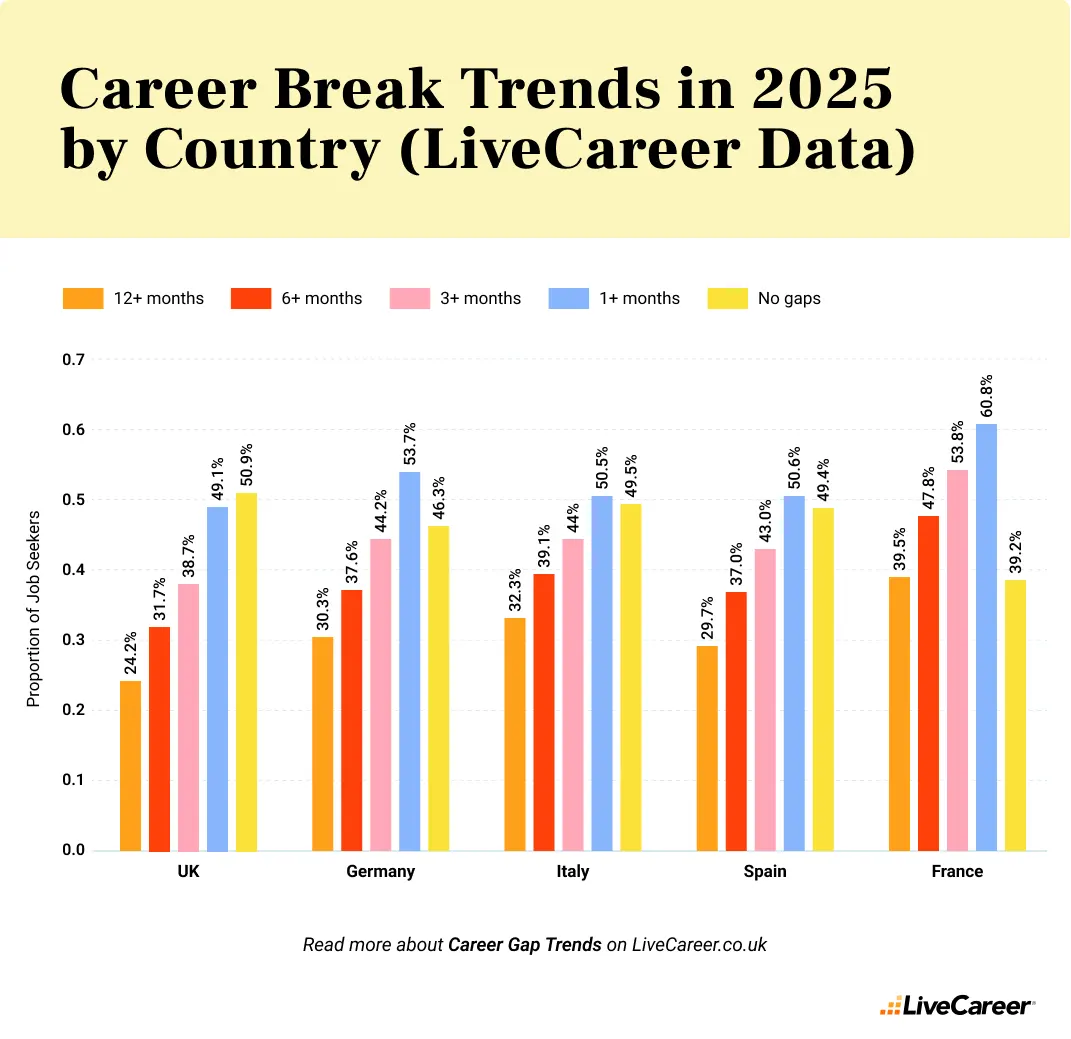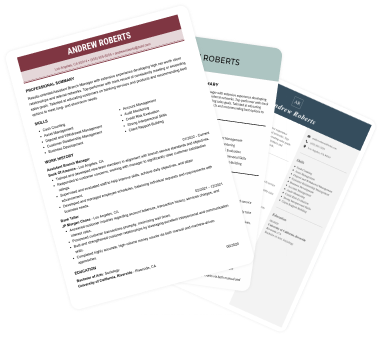![Career Stability vs. Job Hopping in the UK [Real Data]](https://cdn-images.livecareer.co.uk/pages/career_stability_vs_job_hopping_lc_uk_thumbnail.jpg)
Career Stability vs. Job Hopping in the UK [Real Data]
Discover real UK data on career stability vs. job hopping. Explore high-, mid-, and low-stability professions across industries to make informed career choices.
November 7, 2025
Last updated on 29 January, 2026

Our customers have been hired by*:
Nearly half of UK job seekers now have a gap on their CVs. Career breaks – once seen as red flags – have become increasingly common and are gradually losing their stigma. New research from LiveCareer UK, based on an analysis of nearly 19 million CVs from 2020 to mid-2025, reveals that employment gaps are more prevalent than ever among British job seekers. Let’s get into all the details.
The COVID-19 pandemic and evolving work attitudes have normalised non-linear career paths, with both short-term and long-term breaks on the upswing. Below are the key findings from LiveCareer’s data, followed by insights into why career breaks are on the rise, how they’re becoming accepted, and what this means for job seekers and employers in the UK.
These figures demonstrate that career gaps have become increasingly common among UK workers. Long-term unemployment peaked in 2024, with over 1.28 million UK CVs showing a break of 12 months or more, and it remains elevated. Simply put, employment gaps have become a defining feature of the modern British job market.
LiveCareer UK’s analysis of nearly 19 million CVs from 2020 to mid-2025 shows that career breaks have moved firmly into the mainstream of British working life.

In 2025, 24% of UK job seekers had a gap of at least 12 months, up from 18% in 2020 – a 33% rise in long-term breaks. Similarly, the share of CVs showing a gap of at least six months climbed from 24% in 2020 to 32% in 2025, while those with a gap of at least three months rose from 30% to 39% over the same period.
Even shorter absences are more common:
These figures underscore a clear shift: career breaks are no longer rare anomalies, but a regular feature of work histories. This prevalence makes it increasingly difficult for employers to see them as a sign of unreliability. However, bias has not disappeared, with some recruiters still automatically rejecting CVs that show breaks.
The normalisation of career breaks spans all demographics, but is most pronounced among younger workers. According to research by the hiring company Applied, around a third of all UK employees have taken a significant break at some point in their careers. For Gen Z, the figure rises to nearly 47% having experienced a gap of six months or more. For this generation, the notion of a long, unbroken career with a single employer is fading; they’re more open to non-linear career paths that incorporate pauses for upskilling, personal development, travel, or exploration.
Crucially, many now leverage their time away as a career asset. A global LinkedIn study found that 62% of employees have taken a break at some point, and over half of them reported returning with new or improved skills. In the UK, 67% of Gen Z who took a break reported an enhanced skill set, according to Applied’s research. Activities during these periods – from freelancing and volunteering to studying or engaging in cultural travel – often foster adaptability, problem-solving, and cross-cultural understanding.
Employer attitudes toward career gaps are shifting. LinkedIn’s 2022 introduction of a “Career Break” profile section – allowing users to explain common gaps such as caregiving, travel, or professional development – signalled a broader cultural move toward treating time away as a valid, even valuable, chapter in a career. It’s becoming increasingly acceptable and, in many cases, extremely beneficial to include a break directly in your CV, with a brief note on its purpose and outcomes, framing it as intentional and productive rather than something to conceal.
In the UK, campaigns like #DontMindTheCareerGap are pushing employers to “de-bias” hiring. Suggestions such as listing total years of experience instead of exact dates have boosted callback rates by 14% in trials conducted by the Government Equalities Office, ensuring candidates aren’t penalised for short gaps. What’s more, according to LinkedIn, more than 50% of employers say they’re more likely to call back a candidate if they understand the reason for a break – whether for study, raising a child, or another purposeful activity.
While stigma has not vanished entirely, LiveCareer’s year-by-year data shows that the UK is at the forefront of a post-pandemic change in mindset – one in which career breaks are not exceptions that require excuses, but increasingly normal features of modern working life.
The reality is that career breakers often offer considerable value. Data from Career Returners, a UK organisation specialising in return-to-work programs, shows this talent pool is highly qualified:
Far from lacking ambition, many career returners are motivated, skilled, and eager to rejoin the workforce – an asset employers can’t afford to overlook.
LiveCareer’s 2025 CV analysis doesn’t just tell us what’s happening in the UK – it reveals how Britain compares with some of Europe’s other major job markets. The verdict? Career breaks are everywhere, but the story plays out a little differently depending on where you look.

In the UK, 24% of job seekers have been out of work for a year or more – already a significant share, but nowhere near the highest. France leads by a striking margin, with 39.5% reporting a 12+ month gap. Italy (32.3%) and Germany (30.3%) follow, with Spain close behind at 29.7%. This places Britain firmly at the lower end of the long-term gap spectrum.
When it comes to breaks lasting six months or longer, the UK again posts the lowest figure at 31.7%. By contrast, France stands out at 47.8%, with Italy at 39.1%, Germany at 37.6%, and Spain at 37%. In much of Europe, stepping away from work for more than half a year appears far more commonplace than in Britain.
Shorter breaks are no less telling. The UK records 38.7% for gaps of three months or more, compared to striking 53.8% in France and around 44% in both Germany and Italy, plus 42.97% in Spain. For one-month gaps, France again leads with 60.8%, followed by Germany (53.7%), Spain (50.6%), and Italy (50.5%). The UK trails with 49.1%, showing that quick breaks between roles are less common here than in most of its European counterparts.
If you have a spotless CV with no gaps, you’re in the minority across the board. The UK fares best, with 50.9% of job seekers showing continuous employment. Italy (49.5%) and Spain (49.4%) are close behind, followed by Germany (46.3%). France, however, has the smallest share of uninterrupted work histories, at just 39.2%, meaning that the vast majority of French job seekers have experienced at least one career break.
LiveCareer’s data confirms that career breaks are not just a UK phenomenon – they’re embedded in the employment culture of Europe. But the scale differs: France emerges as the standout for both short and long gaps, while the UK consistently sits at the lower end of the rankings. For job seekers, this means gaps are part of a shared European reality; for employers, it’s a clear signal that skills-first hiring is the only sensible approach in a labour market where straight-line careers are increasingly rare.
“These findings reflect an undeniable reality of today’s labour market: career gaps are now the norm, not the exception.”
In other words, having an interruption on your CV is no longer unusual – it’s practically expected. Roughly half of UK job seekers now have at least one employment gap, according to LiveCareer’s data, and other research reinforces how commonplace career breaks have become.
Multiple factors are driving the rise of career breaks in Britain. The pandemic’s economic turmoil, shifting workforce demographics, and changing attitudes toward work and life have all contributed to an increase in people stepping away from work for a time.
Key reasons behind the surge in career gaps include:
COVID-19 triggered mass redundancies and furloughs, forcing many into involuntary breaks. Long-term gaps surged from 2020 to 2022, peaking in 2024 as unemployed workers remained out of work for extended periods. Even as the economy rebounded, fresh challenges (like the 2023–2024 cost-of-living crisis and corporate restructurings) led to renewed layoffs in 2025, again swelling the ranks of job seekers with recent gaps.
The pressures of the pandemic also led many to voluntarily quit their jobs to focus on health and work-life balance, contributing to the “Great Resignation” wave. Mid-career professionals increasingly took sabbaticals to recharge or avoid burnout, viewing temporary exit from the workforce as a path to improved well-being.
Bringing up children or caring for relatives is one of the most common reasons for taking a career break. This primarily affects women in the workforce, many of whom paused their careers during the COVID-19 pandemic to handle childcare during school closures or care for family. Even in regular times, maternity/parental leave, as well as elder care, lead thousands to step away from work each year.
Some breaks are intentional pauses for personal growth and development. Professionals have used “in between jobs” time to go back to education, retrain, or pursue new qualifications – effectively investing in skills for a career change. Others step away to relocate or rethink their career direction entirely before searching for a new role.
Especially among younger workers, career gaps are often used for travel, passion projects or entrepreneurship. Many view extended travel or trying a startup during a “gap career” as a valuable life experience, not a career-killing move.
In short, career breaks can stem from both necessity and choice. In the early 2020s, a perfect storm of factors – a global pandemic, shifting priorities, and evolving norms – led to more people in the UK experiencing some time out of work, whether due to hardship or by design. This trend has persisted even as the economy recovered, fundamentally reshaping typical career trajectories.
For job seekers, the good news is that the stigma around career breaks is gradually fading. Most employers will no longer automatically discard your CV because of a gap. However, how you explain the gap in a CV still matters. You want to present the time off confidently and positively.
Here are some tips to make a career gap a constructive part of your story:
Don’t be ashamed of your career break – instead, be prepared to briefly explain it confidently in interviews or cover letters. If the employment gap was due to a layoff or personal reasons, you can state that matter-of-factly. Emphasise that you’re now ready and eager to return to work. Confidence in discussing your career break reassures employers that it’s not a sign of unreliability.
Frame the break as a period of personal growth, resilience, or reorientation, rather than a setback. For example, you navigated a challenging situation (such as managing family obligations or overcoming an illness) that demonstrates adaptability and perseverance. Or you may have pursued a passion project that taught you new lessons. Portraying your gap as a deliberate “career realignment” or a learning experience can turn it into a positive on your CV.
Think about any transferable skills or experience you picked up while off the traditional career track. Did you do freelance or consulting work? Volunteer in the community? Take an online course or earn a certification? Even caregiving requires soft skills like time management, organisation and empathy. Make sure your CV (or interview answers) mentions these activities and skills. This shows employers that your time off included valuable skill-building.
If you voluntarily took time out, you can describe it as a proactive decision to achieve a goal. Perhaps you “took a planned sabbatical to develop industry-relevant skills via a coding bootcamp,” or “left full-time work temporarily to launch a startup.” By explaining the break as a purposeful step and detailing the outcome (e.g. a completed training, a business attempt, etc.), you signal ambition and planning. You’re showing that the break had a career-related purpose and wasn’t simply drifting “out of work.”
Above all, be honest and concise when addressing a gap. You don’t need to provide highly personal details – just a credible, upbeat explanation and an emphasis on what you bring to the table now. Employers are increasingly understanding about career breaks, especially in the post-2020 era. If you focus on your skills, achievements, and readiness to contribute, a gap in your CV should not hold you back.
With career gaps so common, employers need to adjust old hiring habits. Clinging to outdated biases or requiring “perfect” continuous employment can cause companies to miss out on great candidates. According to LiveCareer’s data, nearly half of job seekers have some break in their background. Hence, a blanket rule against hiring anyone with a gap is not only unfair but also impractical in today’s labour market.
In fact, at a time when the Recruitment and Employment Confederation estimates that talent shortages in the UK may cost the economy up to £39 billion per year in lost GDP, tapping into the pool of career returners is increasingly smart.
Here are some steps employers and HR departments can take to better integrate candidates with non-linear careers:
Drop any hard-and-fast requirement for an “unbroken” work history. Don’t automatically screen out candidates with CV gaps – whether in ATS software or in manual CV reviews. Instead, have a closer look at what the person was doing during that time and what skills they offer now. Judge applicants primarily on their skills, qualifications,and potential, rather than whether every year from graduation to the present is accounted for in a job. Many capable, motivated people have one or two gaps in their CV; consider that context before rejecting them.
Review your job descriptions and interview questions to ensure you’re not inadvertently deterring those with career breaks. For example, avoid phrasing like “must have X years of recent experience” unless truly necessary. Train hiring managers to focus interviews on competencies and outcomes rather than grilling candidates about timeline gaps. If a candidate is otherwise qualified, a career break should not overshadow their relevant experience or qualifications. By making your hiring process more inclusive in this way, you’ll widen your talent pool.
Consider establishing “returnship” programs or supported hiring initiatives for individuals coming back from a long break. These are essentially internships or short-term placements designed to reintegrate experienced professionals who’ve been out of the workforce. Providing additional onboarding, training, or mentorship to returners can help them refresh their skills and confidence, while also allowing you to fill roles with skilled individuals who just need a brief ramp-up. Even without a formal program, ensure your onboarding is empathetic to someone who’s had a gap.
HR leaders must recognise that the workforce has changed. Career gaps often stem from circumstances beyond a candidate’s control or from deliberate growth choices – neither of which reliably predicts performance. Employers who value skills over uninterrupted timelines can tap into a wider talent pool, gaining team members with diverse experiences, resilience, and self-direction, while building a more inclusive workplace.
Career breaks are now a natural part of working life in the UK. LiveCareer UK’s data shows that an uninterrupted career is no longer the norm. For job seekers, a gap is not the end of your story – it’s a chapter you can own and use to propel your next step. For employers, it’s a call to focus on skills and potential, not perfect timelines. Those who embrace non-linear careers will uncover exceptional talent; those who don’t risk missing it entirely. Career breaks are here to stay, and embracing them is key to building stronger futures.
The findings are based on an analysis of nearly 19 million documents created using LiveCareer UK CV builder between January 1, 2020, and June 31, 2025. The analysts used SQL to identify career gaps by analysing user-provided job titles, employers, and employment dates. To ensure accuracy and reduce duplication, only each user's most recent CV was included, assuming it reflected their most current work history.
LiveCareer UK’s editorial team has reviewed this article for compliance with LiveCareer’s editorial guidelines. It’s to ensure that our expert advice and recommendations are consistent across all our career guides and align with current CV and cover letter writing standards and trends. LiveCareer UK CV builder is trusted by over 10 million job seekers, supporting them on their way to finding their dream job. Each article is preceded by research and scrutiny to ensure our content responds to current market trends and demand.
Category: Career Advice
Crafting a job-winning CV is all about showcasing your unique skills and experiences. Start with a strong personal statement that highlights your career goals and achievements.
Try Our CV Builder Now